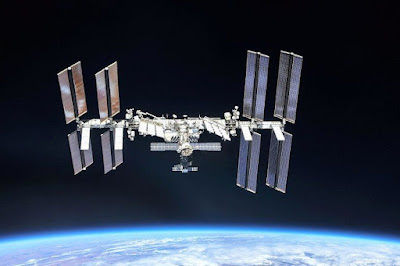In a news conference from aboard the International Space Station, Butch Wilmore and Suni Williams said they had confidence in the troubled spacecraft to get them home. (NY Times, July 10, 2024)
I know in their place I would worry, seeing earth whole
––oceans, continents, poles––
and they themselves . . .
No, says NASA, the astronauts are not in danger, not stuck in space; they’re just doing some additional testing of the thrusters. But the questions continue, variations on a theme: How confident are you that the Starliner will get you home safely? Butch and Suni are patient, though they have taken time out of their work for this. A reporter persists: Can you give us examples... about the status of Starliner as far as being able to bring you back to earth safely? Suni smiles, bats away his concern: It’s great to be up here. Her casual manner seems grounded in certainty; her wavy hair flies out from her head in all directions, wiry, Medusa-like––will we be turned to stone for questioning the logic of this optimism?
I know about the vanishing rain forest,
melting ice sheets, spreading desert and yet,
how thrilling it would be to see it all as they do:
our one and only so fragile suspended out there...
Horn of Africa,
Malay Archipelago,
Isthmus of Panama––delicate waist of America,
the poet called it. Hell on earth
say those crossing the Darien Gap
from Peru, Ecuador, Venezuela, Brazil, Haiti, Ethiopia, India, China,
Democratic Republic of the Congo––
no, from up there I wouldn’t see the ant-like procession,
ragged, polyglot,
on any given day a planet worth’s sampling, citizens
of nowhere-on-earth-that-is-safe–
Yes, the astronauts confirm, they were able to watch the hurricane that became Beryl. The question gets more personal: What have you heard from your family? Was there any damage to your house? Still smiling, they pass a mike back and forth between them or allow it to float free for a few seconds. Well, says Butch, we’ve got some downed trees like most people... but thankfully we’ve got good church folks and good neighbors that are coming by...
The news conference is coming to an end. In Texas, concludes Suni, everybody pulls together. She launches herself into a weightless backward flip.
Author’s note: NASA is now considering bringing the astronauts home on a Dragon SpaceX capsule, an option which would mean that Wilmore and Williams would need to remain on the space station for six more months. A decision about this will be needed, says NASA, by the end of August.
Kathleen McIntosh moved to New England following a peripatetic childhood. She remained there, teaching language and literature for many years. Now retired, she lives in Connecticut where she writes poetry and serves on the Board of the Connecticut Poetry Society.

